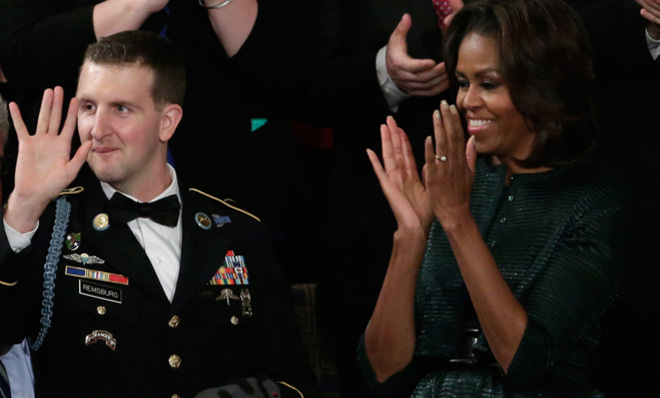Should presidents use wounded soldiers as political props?
The "hero in the balcony" has made an appearance in almost every SOTU since Reagan's 1982 address


A free daily email with the biggest news stories of the day – and the best features from TheWeek.com
You are now subscribed
Your newsletter sign-up was successful
One of the most moving moments during this year's State of the Union address was when U.S. Army Ranger Sergeant Cory Remsburg received a two minute standing ovation after being praised by President Obama.
Remsburg was nearly killed by a roadside bomb in Kandahar, Afghanistan in 2009. As ABC News reports, the explosion left him in a three-month coma and rendered him partially-paralyzed and brain damaged. After daily physical and speech therapy, Remsburg can walk and speak again.
Obama used the solider as a symbol of how America "never gives up" and "does not quit."
The Week
Escape your echo chamber. Get the facts behind the news, plus analysis from multiple perspectives.

Sign up for The Week's Free Newsletters
From our morning news briefing to a weekly Good News Newsletter, get the best of The Week delivered directly to your inbox.
From our morning news briefing to a weekly Good News Newsletter, get the best of The Week delivered directly to your inbox.
But was he right to invoke Remsburg this way?
The "hero in the balcony" has been a feature of nearly every State of the Union address since Ronald Reagan pointed to Lenny Skutnik in 1982 to commend him for rescuing a woman in the freezing Potomac river after a plane crash.
There's no argument that it was a very emotional moment. As Andrew Sullivan noted, "I've heard several presidents invoke military heroism in their speeches. I cannot recall one so moving."
But there was something also very different about Remsburg.
A free daily email with the biggest news stories of the day – and the best features from TheWeek.com
At TIME, Nick Gillespie (the editor-in-chief of libertarian Reason.com) puts it most clearly:
The government under Republican and Democratic presidents has spent virtually the entire 21st century sending young men and women to fight in ill-defined and unsuccessful elective wars. That's bad enough, but then to use them as props in political speeches? That's positively obscene. [TIME]
The politicians who spent two minutes saluting Remsburg seemed to evade responsibility for putting him there in the first place.
Sure Remsburg could be a symbol of a nation that doesn't quit. But he could also be a symbol of a nation that sometimes makes tragic mistakes as well.
Taegan D. Goddard is the founder of Political Wire, one of the earliest and most influential political websites. He also runs Wonk Wire and the Political Dictionary. Goddard spent more than a decade as managing director and COO of a prominent investment firm in New York City. Previously, he was a policy adviser to a U.S. senator and governor. Goddard is also co-author of You Won — Now What? (Scribner, 1998), a political management book hailed by prominent journalists and politicians from both parties. Goddard's essays on politics and public policy have appeared in dozens of newspapers across the country, including The Washington Post, USA Today, Boston Globe, San Francisco Chronicle, Chicago Tribune, Philadelphia Inquirer, and Christian Science Monitor. Goddard earned degrees from Vassar College and Harvard University. He lives in New York with his wife and three sons.
-
 Political cartoons for February 20
Political cartoons for February 20Cartoons Friday’s political cartoons include just the ice, winter games, and more
-
 Sepsis ‘breakthrough’: the world’s first targeted treatment?
Sepsis ‘breakthrough’: the world’s first targeted treatment?The Explainer New drug could reverse effects of sepsis, rather than trying to treat infection with antibiotics
-
 James Van Der Beek obituary: fresh-faced Dawson’s Creek star
James Van Der Beek obituary: fresh-faced Dawson’s Creek starIn The Spotlight Van Der Beek fronted one of the most successful teen dramas of the 90s – but his Dawson fame proved a double-edged sword
-
 The billionaires’ wealth tax: a catastrophe for California?
The billionaires’ wealth tax: a catastrophe for California?Talking Point Peter Thiel and Larry Page preparing to change state residency
-
 Bari Weiss’ ‘60 Minutes’ scandal is about more than one report
Bari Weiss’ ‘60 Minutes’ scandal is about more than one reportIN THE SPOTLIGHT By blocking an approved segment on a controversial prison holding US deportees in El Salvador, the editor-in-chief of CBS News has become the main story
-
 Has Zohran Mamdani shown the Democrats how to win again?
Has Zohran Mamdani shown the Democrats how to win again?Today’s Big Question New York City mayoral election touted as victory for left-wing populists but moderate centrist wins elsewhere present more complex path for Democratic Party
-
 Millions turn out for anti-Trump ‘No Kings’ rallies
Millions turn out for anti-Trump ‘No Kings’ ralliesSpeed Read An estimated 7 million people participated, 2 million more than at the first ‘No Kings’ protest in June
-
 Ghislaine Maxwell: angling for a Trump pardon
Ghislaine Maxwell: angling for a Trump pardonTalking Point Convicted sex trafficker's testimony could shed new light on president's links to Jeffrey Epstein
-
 The last words and final moments of 40 presidents
The last words and final moments of 40 presidentsThe Explainer Some are eloquent quotes worthy of the holders of the highest office in the nation, and others... aren't
-
 The JFK files: the truth at last?
The JFK files: the truth at last?In The Spotlight More than 64,000 previously classified documents relating the 1963 assassination of John F. Kennedy have been released by the Trump administration
-
 'Seriously, not literally': how should the world take Donald Trump?
'Seriously, not literally': how should the world take Donald Trump?Today's big question White House rhetoric and reality look likely to become increasingly blurred
